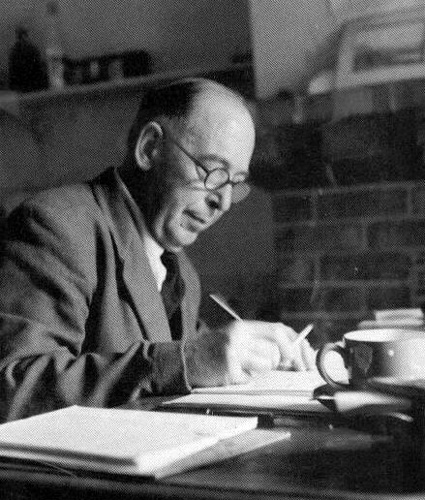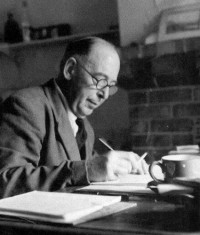
C. S. Lewis lived before computers, cell-phones, TVs, and blogs. Also, for most of his life, he was unmarried. Having said that, all of us who strive to write can learn something from C. S. Lewis about his ideal daily writing routine as a full-time author.
The following comes from chapter 9 of his autobiography: Surprised by Joy: The Shape of My Early Life.
I would choose always to breakfast at exactly eight and to be at my desk by nine, there to read or write till one. If a cup of good tea or coffee could be brought me about eleven, so much the better.
As step or two out of doors for a pint of beer would not do quite so well; for a man does not want to drink alone and if you meet a friend in the taproom the break is likely to be extended beyond its ten minutes.
At one precisely lunch should be on the table; and by two at the latest I would be on the road. Not, except at rare intervals, with a friend. Walking and talking are two very great pleasures, but it is a mistake to combine them. Our own noise blots out the sounds and silences of the outdoor world; and talking leads almost inevitably to smoking, and then farewell to nature as far as one of our senses is concerned. The only friend to walk with is one who so exactly shares your taste for each mood of the countryside that a glance, a halt, or at most a nudge, is enough to assure us that the pleasure is shared.
The return from the walk, and the arrival of tea, should be exactly coincident, and not later than a quarter past four. Tea should be taken in solitude, …for eating and reading are two pleasures that combine admirably. Of course not all books are suitable for mealtime reading. It would be a kind of blasphemy to read poetry at table. What one wants is a gossipy, formless book which can be opened anywhere…
At five a man should be at work again, and at it till seven. Then, at the evening meal and after, comes the time for talk, or, failing that, for lighter reading; and unless you are making a night of it with your cronies there is no reason why you should ever be in bed later than eleven.
Such a routine will not work for all of us, but the point is to have a routine, and to know when your best writing and thinking hours are, and in the other hours, do things that both stimulate and stretch the brain in new and creative directions.
How about you? Do you have a writing routine? What does it look like? What the essentials? When are your best writing hours? How do you let your mind relax?




“What one wants is a gossipy, formless book which can be opened anywhere…” FUNNY!
Yes, but here is what he thinks are gossipy, formless books:
-Herodotus
-Lang’s History of English Literature
-Tristram Shandy
-Elia
-Anatomy of Melancholy
Most of us would consider these “heavy” reading.
Thanks. The main problem for me in following this kind of schedule is that I have a full-time job. I also like to sleep so getting up early enough to write is difficult. But I’m working at it. And I’ll have to work at it harder. Wish me luck.
Dan,
Yes, I think this was Lewis’ routine as a full-time writer. Also, remember that he was not married, and did not have kids. Plus he appears to have had someone in the house to make his meals and bring him tea.
So I don’t think this schedule is realistic for most of us. But good job getting up early to write. I need to get better at that, as I write best when the house is quiet.
Good luck!
I routinely plan to have a writing routine. Shockingly, it never pans out.
Have you read Steven Pressfield’s “The War of Art?” Having a consistent writing routine, i.e. just showing up to do the work every day regardless of how the writing goes, is his prime point. By making yourself available, the muse may just show up.
In my selfishness, I want the muse to always to show up, so I get far too easily discouraged. Sticking to the routine is what I need. Thanks for the reminder Jeremy.
Blake,
I just ordered that book last week. It has not arrived yet, but I am looking forward to reading it.
Great post. Of course, as you mentioned, this isn’t necessarily a realistic schedule for most, but I love the dedication. I haven’t been writing for very long, right now I just try to blog regularly and of course read as much as possible, but as with anything else that’s important, I need to be more intentional and always allowing what I love to do grow and evolve. Very encouraging, thanks!
Thanks for the comment. It was encouraging for me as well.
I came and checked out your blog. I like what you are writing about, and it looks like you have some good things to say. Keep at it!
Focus, structure, and writing patterns… that’s that Lewis had, and what we writers need.
wow this is great, i haven’t read any thing in CS Lewis’s words at length for a long time… not since high school… wow that was 6 years ago.
Thanks again for the post, also enjoyed the writing tips by cs lewis article you wrote.
The writing of CS Lewis is always worth reading!
I love the last line “unless you are making a night of it with your cronies there is no reason why you should ever be in bed later than eleven.” That is so true, but I find getting to bed before midnight immensely challenging, especially now that I have children and a neverending to-do list!
Talya,
Yes. Remember that Lewis never had children. He was able to set his schedule and keep it just as he liked. This is impossible for us with families!
Lewis: “If a cup of good tea or coffee could be brought me about eleven…”
Mmm, I guess this second idea won’t work for me; I have no one to bring me my Bustelo coffee at 11:00. 🙁